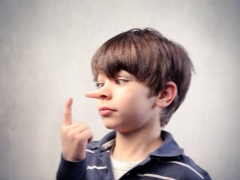Why does a child lie and what to do? Effective advice of a psychologist
All parents try to cultivate honesty in their children. This quality is included in the list of standard human values. And what is the surprise of parents, when the little mummy, having barely learned to speak, begins to lie? The adult logic immediately draws unpleasant perspectives to us: a small lie began, then a big lie, then a pathological one, what will grow out of this person?
Smart and serious adults, let's not dramatize the situation! Children's lies are a cry for help. Your child needs your support. In addition, the lie of the child always, in all cases without exception, has a positive intention. It sounds a bit strange, I understand, but I will try to prove it to you.
And I'll start with us adults. Tell me, who among us is not lying? According to statistics, which was compiled by a large-scale sociological research, all the same notorious British scientists, people for the average life deceive each other at least 88 thousand times! An adult, thus, cheats about 4 times a day. This is an average value, some do it more often.
Men are more prone to deception - they “hang noodles on their ears” more than 5 times a day, women 3-4 times. Silence of truth and secrets (of which each of us has a car and a small truck) are also forms of lies.
It turns out that humanity is hopeless? Not. A lie is a protective mechanism that helps each of us to adapt to society. Moreover, a lie is comfortable not only for those who lie, but also often for those who have been told a lie.
So, if adults lie, what do we want from children? The only difference is that adults can use a lie as a useful tool for themselves. Most of the children use it as a shield. In addition, the lie helps in the formation of the child's psyche.
What kind of untruth can be considered harmless, and what will have to fight?
Types of lies
Prominent American specialist in the field of psychology of emotions, Paul Ekman, divided lies into several types:
- Lie justified. A measure necessary in some circumstances.
- The lie is "white." Cheating for good. It is designed to defuse a tense situation or deliver positive emotions to someone.
- Scam Self-serving lie for personal gain.
- Boasting. This is an exaggeration of self-worth, opportunities, social status.
To this list of an American doctor of psychology, I would add more fantasy. But they are peculiar to children, harmless in nature, and even go to the benefit of - develop creative thinking.
So what's the positive intent lies in a lie? Justified lies are somewhere near and the instinct of self-preservation. This is protection. “White” lies have a goal to make someone pleasant, this is a positive intention. Positive and the desire to get money, wealth, love, respect of others. That is why adults and children are lying. Thus it is foolish to condemn a lie, because the person wanted the best! But in any case it is impossible to disregard children's lies. Otherwise, a decent person will not really grow out of a child.
Why does a child lie?
- To him impose excessive demands. And the higher the bar of the parents' expectations, the more often and virtuously the child lies, so as not to disappoint the idealizers of his parents with their real actions.
- The child has a crisis of trust in a relationship with relatives. This is the most common cause of childish deception.Usually it is not single, and can be traced in all cases when the child speaks a lie.
- The child is raised in excessive severity. And the kid constantly lies to avoid another punishment for something.
- The child loves his parents very much. Yes, no matter how strange it may sound, gentle affection sometimes pushes the child on the path of untruth. If you admit that “his pranks will soon bring you to the grave” or grab your heart at the sight of broken dishes, painted wallpaper and glue spilled on the carpet, the kid will quickly remember and hide the truth and tell tales to keep your health and soul equilibrium.
Found out in this list of your child? Then you are halfway to success in dealing with the lie. After all, knowing the causes of deception helps to eliminate the problem itself.
Age features of children's lies
2-4 years
At this tender age, all the crumbs are cute dreamers. Children are just learning to create mental images, and often give what is invented as real. So, the crumb can enthusiastically tell you how he saw a flying cat or a pink elephant in the morning. Do not interfere with the dreamer. Do not stop his fables on the vine. After all, it is at this age that you can kill in the younger man of genius.
Help him realize fantasy. Suggest painting a flying cat or a pink elephant and pretend that you believe in their existence.
4-5 years
At this age, babies are not yet able to distinguish reality from falsehood. They sincerely believe in your lies, and are already beginning to practice their own. Most often this happens with guys who are faced with disapproval or reprimand from adults. They lie because they are afraid of losing their love. For example, the kid asks if he has removed the toys, confidently says that he has removed.
Despite the fact that the bears and cars continue to wallow in artistic disorder, the crumb does not want to upset the mother, who is waiting for help from him in cleaning. Talk to your child in confidence. Establish contact. Try to behave benevolently. Promise not to punish him if he tells the truth.
And most importantly - let the baby know that he is loved and appreciated by anyone. When he learns it, the need to deceive will disappear by itself.
7 years
At this age significant changes occur with the child. Boys and girls go to school, and now they need personal space - a place, a room, a corner where they can be masters. If it is not, the child lies, hiding behind it, like a shield. Help the chad to organize such a space. Naturally, within reason.
And also explain that the independence that appeared in him is not permissiveness at all. Most likely, the scion will repeatedly “try you for strength”, including with the help of lies.
8 years
At this age, the child’s desire to please others at any cost is very noticeable. For the time being, the main thing for him is the opinion of the parents, so it’s on mom and dad that the lies will be addressed, the purpose of which is to hide their mistakes and misfortunes from loved ones. So students hide from relatives the fact of receiving a bad evaluation.
Talk to the child, he is already able to understand that the lie - the salvation is temporary, and all the secret becomes clear. Do not assign him guilty, do not try to sort out the relationship.
9-10 years old
A growing child often begins to lie in order to win a more socially important place among peers. He already understands the difference between truth and untruth. But how inspired are the stories! You hear so much!
Children at this age tend to invent stories for classmates about the wonderful and prestigious work of their parents, luxurious living conditions, the guys brag about non-existent "cool" toys and gadgets and personal acquaintance with movie or sports stars. What to do? Yes, by and large, nothing.
Remember yourself at this age: you must have done the same! Just control the situation so that the lie of your son or daughter does not exceed the limits of reasonable and do not harm others.
11 years
The cause of children's lies at this age usually lies in a neglected crisis of trust in the family. And also may be a consequence of strict education. Lower the bar of requirements, think about why the child does not trust you. It is not too late to correct the situation - independently or with the support of a specialist.
If a lie does not win now, it will be more difficult, because a teenager requires a certain amount of independence and will try to get it at any price, even not true. Do not pull and sign up the whole family for a consultation with a psychologist or psychotherapist.
12 years
Your teenager has already set personal boundaries. Now he will persistently expand them. If parents try to penetrate into the space of a son or daughter by force, they will meet rudeness, aggression and lie.
Remember: in your personal life, a child at this age can only invite you. If he does not, adjust the level of trust in your family. Do not blame the child in any way. It develops in strict accordance with the laws of nature. And a lie is its defense mechanism.
After 12 years, teens usually lie masterfully, and it becomes increasingly difficult for adults to recognize cheating. And the reasons for which they do it, is added.
Young liars are trying to compensate for the lack of attention, protect their friends, defend their position or great personal secrets, strive for self-assertion and try on the mantle of the leader, fear humiliation, shame, shame, hide problems in the team and, as we already know, by all means protect boundaries of personal space from the penetration of adults. See what load?
How to wean lie?
With this question, parents often turn to educators, teachers, psychologists, looking for the truth in the vastness of the Internet. At the same time, they often receive “bad” advice, which can only aggravate the situation. One of these tips is to apply physical punishment.
Children's lies - not the case to argue about the benefits and dangers of flogging. You just need to take, for granted, that a child cannot be smacked for lying. It will be a war with "windmills". Without punishment, he knows perfectly well what he is doing wrong. Therefore, adolescents so often develop depression amid lies. They are afraid of double punishment - both for a bad deed, and for a lie that has been disguised by the muck done. At the same time they are afraid of exposure. This is a great stress.
Effective methods to wean a child from a few lies:
- Search for reasons. With this you need to start in any case.
- Overcoming the crisis of confidence. A conversation with a baby or a serious conversation (without shouting and insults) - with a teenager.
- A great way to reduce the flow of lies can be your proposal to conclude a written contract. You undertake to buy a child something that he has long dreamed of. In response, he undertakes to speak the truth and nothing but the truth. In the case of a lie, the contract is canceled. Hang up the signed paper.
- Stop making a child's lie a huge problem. If it is not of a chronic nature, does not harm others, then by and large there is nothing terrible in it. Remember how many times a day an adult is lying according to statistics ...
Psychologist tips
- It is not necessary immediately, as soon as the children's lies were discovered, to start thinking through a plan for the effective punishment of the wretch. Start with yourself. See how often you tell a lie to a child, maybe this will help to understand what the root of the problem is.
- There is no one recipe for fighting child lies. How many children - so many reasons for lies. And this means that there are as many ways to eliminate deception.
- If a teenager is lying, power methods are generally useless and can lead to a deterioration in relationships. One of my friends of her son - “lied” years with 12 “treated” with a strap. Think you stopped cheating? However so. By the age of 14, he not only composes “as he breathes,” but also steals money mother for personal needs. In order to prevent such a gap in the relationship, try to communicate in confidence with the teenager.
- Specialist assistance is required if a child who has reached the age of 10 lies too often and for any reason. This may indicate violations of the psychological background, personal development, and in some cases, the presence of neurological and psychiatric diseases.
- If your liar is from 3 to 5 years old, often turn out the untruths into a joke. Laugh at her together.
- Having decided to talk, remember that talking to a child about the dangers of lying is better in private. Do not make a noisy scene. Do not do this with strangers. Sometimes it is better if one of the parents talks to the child whom he trusts more. In the absence of another. Intelligently tell what can lie, how unpleasant to communicate with a liar, and what the consequences may come. Do not hesitate, give examples from personal experience, when a lie turned around for you in an extremely uncomfortable and unpleasant situation. Focus on your feelings at the time of exposure. Everyone has such examples from life. I, you, the first persons of the country, have stars from the TV screens. If you say that you never lied, you are lying right now.
- Adults should keep their feelings and emotions under control. Children feel very good when their lies “hit the mark.” Do not let lies break your relationship.
Remember that there are no bad and good children. All children are good. And even with a lie they try to convey to you their positive intention. The main thing is to recognize in time why the child does it, what type of lie he uses (he is silent about reality, distorts it, or even writes something that he did not have in reality). And only then, seven times taking a deep breath, as the samurai do before making a decision, proceed to eradicating the eternal human lack - lies.
In the next video, psychologist, positive psychotherapist Spiridon Hovhannisyan tells why the child is lying and how to disaccustom him from it.
Check out other videos.
About what reasons lead to the fact that the child grows up "pathological liar", says the following video psychologist Veronica Stepanova.

























